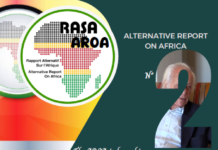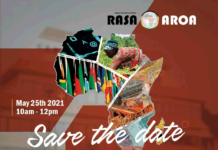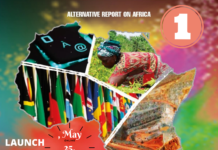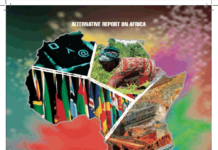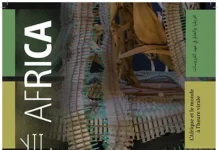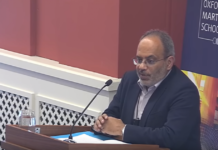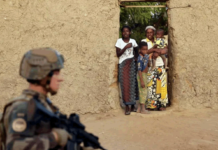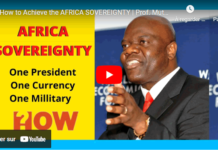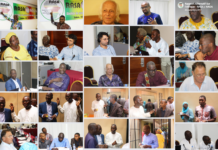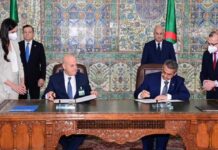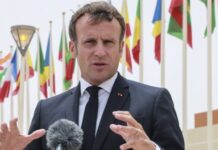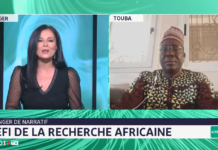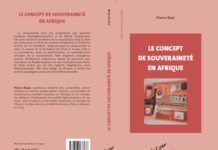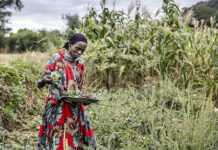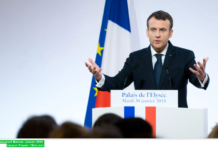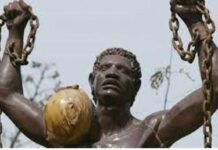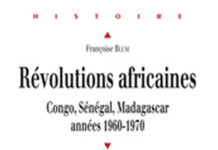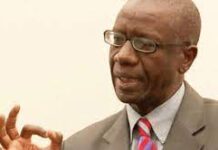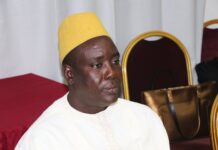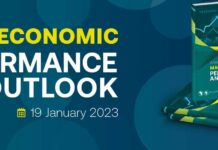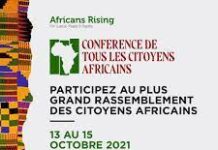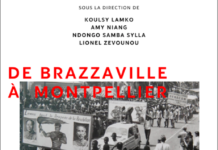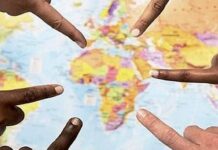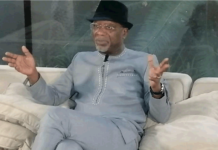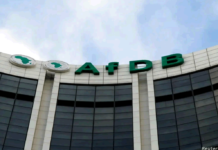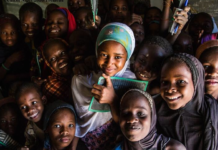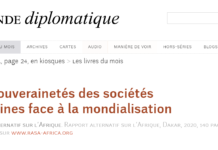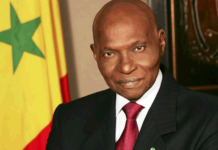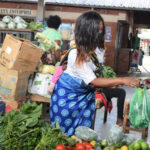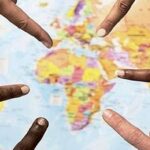At home, French politicians mainstream far-right conspiracies about the replacement of whites by African immigrants. Abroad, they continue to intervene militarily and economically in the continent. Both are signs of a nation unwilling to accept its decline.
Sarkozy’s reign offers the basic formula of French politics in Africa: a lurch to the right in the metropole, characterized by strident anti-immigrant policies and fearmongering about an endangered — white — French electorate; a promise of a new dawn made in Africa; and a politics of elite connivance and manipulation in what France has long considered a zone of limited French sovereignty, and in which ultimate power has always rested in Paris.
After independence in 1960, the CFA franc, the French-backed and -controlled currency used in many of its former colonies, ensured export markets for French goods and access to African resources at below market rates. For many years, French energy security was guaranteed by its African satellites, while frequent military interventions — one every fifteen months — ensured that the rulers of the post-colonies met with the approval of the French political class.
Macron’s Rebrand
Macron’s promise of a new relationship with Africa has consisted in putting lipstick on Françafrique without changing the basic logic of Franco-African relations. This is not to say that the application of this makeup has been completely unsuccessful: Macron’s visit to Rwanda in May 2021 came with an apology for France’s role in the 1994 genocide and enabled Paris and Kigali to normalize relations, and the return of twenty-six artifacts to Benin, looted by colonial soldiers in 1892, was a landmark in the long struggle to restitute African objects held in French museums.
Often, though, even the symbolic accomplishments of Macron’s presidency have been thrown off course by France’s rightward tailspin. Published in January 2021, a report that Macron commissioned, aimed at the “reconciliation of memories between France and Algeria” and written by the historian Benjamin Stora, stopped short of recommending that France apologize for its crimes during the Algerian War of Independence. In introducing the report, a spokesman for Macron underlined that there would be “no repentance, no apologies” for French colonialism. Striking a less adversarial tone on the campaign trail in 2017, Macron had called the colonization of Algeria a crime against humanity.
"Macron’s rebrand is focused on memory and representations rather than on changing the fundamentally unequal economic relationship of Franco-African dealings".
By 2021, he was on the campaign trail again, this time attempting to ward off the threat of the far-right demagogue and enthusiast for the halcyon days of French colonialism Éric Zemmour. The founder of the political party Reconquête (Reconquest) insisted on the need for France to decolonize itself from immigrants and Islamists. In October 2021, after Macron claimed that the ruling Algerian regime was built on the exploitation of the memory of the war of independence, and then halved the number of visas available to the North African nation’s citizens, Algiers — already angry about what it saw as a whitewashed report by Stora — recalled its ambassador to France and banned French military planes from its airspace.
Macron’s rebrand, successful or not, is focused on memory and representations rather than on changing the fundamentally unequal economic relationship that characterizes Franco-African dealings. His proposed reforms to the CFA franc are symbolic at best and regressive at worst. Macron announced, for instance, that French representatives will be withdrawn from the board of the central bank of the West African CFA franc zone — a meaningless gesture, given that the fixed exchange rate between the euro and the franc ensures the role of the board is largely symbolic.
The summit came on the back of Senegalese protests that targeted French property in April 2021 and a wave of anti-French feeling around francophone Africa from people angry that the former colonial power had still not relinquished its control of the region. While the summit featured ambitious proposals for the transformation of development aid and the restitution of looted artworks, it came just months after the old Françafrique had reared its head. Macron was the only Western president at the funeral of the authoritarian leader of Chad (and loyal French client) Idriss Déby, in April 2021. France’s president then oversaw the coronation of Déby’s son as dictator and de facto president. Despite talk of a transformed relationship with Africa, Chadian troops remain useful for France’s ongoing efforts to combat an Islamist insurgency in the Sahel. Dictatorship in Chad is a worthwhile price to pay for advancing France’s foreign policy objectives.
Imperial Decline
The continuities of Franco-African relations, however, shouldn’t blind us to how much has changed on the continent since 1994, the annus horribilis of Françafrique, when France, under pressure from the International Monetary Fund, suddenly cut the value of the CFA franc in half. This move led to widespread protests across West Africa and lasting resentment. In the same year, France backed the Hutu elite in Rwanda. In March 2021, a report written by an expert commission established by Macron found that France bore “heavy and overwhelming” responsibility for the genocide that followed.
Since then, the French presence in West Africa has decreased: its military presence is but a third of what it was in 1990, and the expatriate French population has shrunk. France can no longer count on being the privileged actor in its former colonies. While France has slashed development aid to francophone Africa since 1990, Chinese direct investment has rocketed, increasing by 400 percent in Niger from 2009 to 2019 and 750 percent in Chad. Rather than being dependent on French political will, West African countries now find themselves courted by any number of admirers, including wealthy Gulf states and Russia.
If Françafrique lives on, it is largely as a function of the elite compact that has always defined it. For the remaining rulers of an older Africa who were put in place before contemporary electoral cycles, such as Paul Biya in Cameroon, France remains a useful ally. For France, the fiction of a still functioning Françafrique in which it remains the central power broker in West Africa allows politicians to assuage France’s wounded pride and make a claim for their country’s continued global importance, with its own sphere of influence outside American dominion.
The reality of France’s changing relationship with francophone Africa seems of little interest to the French electorate. Certainly, no questions of actual foreign policy toward Africa have bedeviled the current elections. The continent is worthy of only two mentions in the manifesto of Valérie Pécresse, the beleaguered right-wing candidate for Les Républicains, squeezed between the rightward swing of Macron and Le Pen and Zemmour’s implacable demagoguery. Africa fairs little better on the left, earning only one mention in Anne Hidalgo’s lengthy socialist manifesto — predictably, in relation to the need to control migration.
Fighting at Home and Abroad
Although policy toward Africa — let alone the lives of Africans — is of little interest to the French electorate, the continent continues to play a symbolic role in the country’s political imaginations. Until the war in Ukraine turned the French public toward more quotidian concerns about gas prices and purchasing power, the election had been fought over France’s diminished place in the world, Islamism, immigration, and French identity. Amid historically low crime rates, Macron tried to head off the right-wing threat to his presidency by announcing that he would combat the ensauvagement of the country by getting tough on crime and combatting radical Islam.
This election campaign has also seen the previously marginal theory of the “Great Replacement” becoming mainstream. Proposed by Renaud Camus, the theory holds that Europe is being invaded by migrants bent on replacing its white population. It has been taken up not only by Zemmour but also by Pécresse, who, at a rally in February 2022, announced that her only problem with the theory was that there was still time to stop it. All the main candidates in the election rely on the image of a dangerous — black, Muslim — invader threatening the true France.
Africa is no longer the site for a fantasy of France’s civilizing mission but rather the locus of fears about foreign immigrants and evil Islamists. The countries stretching along the Sahel belt provide something of a perfect storm for these anxieties. A necessary staging post for migrants on their way from sub-Saharan Africa to Europe, over the last decade, the Sahel has also become the battleground for an Islamist insurgency that now controls swathes of Burkina Faso, Mali, and Niger.
This is the ugly militarism of a diminished country in the spell of nightmares about immigration and Islam.
If France fails to deal with the security crisis created by the insurgency, or so the rhetoric goes, then the population explosion in sub-Saharan Africa will soon deposit Islamic immigrants at the gates of France. But if Africa largely figures in French politics as a racist specter used to court voters, what is less remarked upon is the military framework required to enact the material elements of that vision: the restriction of migration via EU-sponsored partnership agreements with governments in the Sahel, which often violate the human rights of migrants, and French military campaigns against the Islamic insurgency.
A relatively successful initial French campaign in 2013 — Operation Serval — disrupted a jihadi threat to Bamako, Mali’s capital. The insurgency, however, then dispersed and became harder to combat. The French mission had its own ambiguities. Operation Barkhane had five thousand French troops engage in a drawn-out guerrilla war for six years, which saw two million displaced and tens of thousands killed, but the insurgency unbowed. The French might have won every battle, or so the saying goes, but they lost the war. In June 2021, France announced the drawdown of the operation, but by then the damage had been done. France had lost the confidence of the region, and its military was disgraced.
With the exception of Jean-Luc Mélenchon, the left-wing activist for La France Insoumise, every leading French presidential candidate has insisted on the necessity of a continued military presence in francophone Africa. For candidates like Zemmour, this is a contentless boast designed for domestic digestion, intended for French stomachs upset by a loss of global influence. However, there is unanimity among the country’s political establishment: France’s military must stay in Africa.
The nature of this military presence looks rather different from the heyday of Françafrique, when the French army would swoop in to determine presidents and support its chosen regimes. Since the drawdown of Operation Barkhane, Macron has attempted to share the burden of military security in the Sahel with the EU, the UN, and an American government that has long provided drones, intelligence, and logistical support, despite its hesitations. Macron’s vision is of counterinsurgency on a shoestring budget, enforced by local conscripts — hence Chad’s importance — and special forces operations.
This is the ugly militarism of a diminished country in the spell of nightmares about immigration and Islam, no longer in a position to determine the internal policies of francophone Africa. As France is expelled from Mali and anti-French sentiment runs high across the region, what remains of its postcolonial domination of West Africa is the enduring economic exploitation enabled by the CFA franc zone and the military bases strung across the Sahel. These are the material correlates of the politics of fear chanted back in the metropole.
That these bases are everywhere unremarked upon indicates the degree to which the French political class is virtually unanimous in its agreement on political strategy in Africa. Only Jean-Luc Mélenchon, who has surged to third place in the polls, offers another possibility. Unusually for a French presidential candidate, his manifesto includes actual discussions of policy issues in relation to Africa — to wit, ending the French military presence in the Sahel, the fundamental reform of the CFA franc, and respecting the rights of refugees.
During the current election campaign, Mélenchon has repeatedly referenced the concept of créolité, drawn from the work of Martinican poet and philosopher Édouard Glissant. It is simply a fact of life, Mélenchon claims, that cultures come together and create something new. In a television debate with Zemmour in September 2021, Mélenchon claimed that assimilation — so beloved of the French right — is a meaningless concept. There are no hordes at the gates. A unitary French cultural identity is a fantasy. Nothing needs to be protected. And if there are no hordes at the gates, Mélenchon continues, then the Sahel does not need to be militarized to prevent them arriving.
This last claim is one that is in sync with an increasingly diverse and cosmopolitan French social reality excluded from the confines of political debating halls, in which the candidates remain deeply out of step with the political present. In contemporary French political debates, Africa itself, as it protests the continued practices of Françafrique and continues to be devastated by the crisis in the Sahel, has disappeared from view.
Source: www.jacobinmag.com


